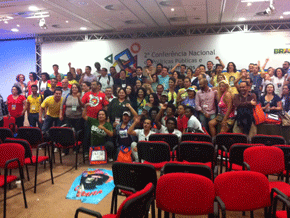The II National LGBT Conference ended at 2am last Sunday (18/12), in Brasília. For four days, more than a thousand activists from all over Brazil debated proposals, evaluated progress and setbacks with regard to the application of public policies aimed at the gay community.
The event, which began amid strong protests from activists against the Dilma government, ended with positions critical of the federal government and gay activism itself.
The website report The Cape He spoke to some present to take stock of the event in terms of organization and political effectiveness. The consensus opinion among those interviewed is that we are experiencing a moment of political impasse and stagnation. While some consider that there is progress, others point to a gay movement that needs political training to improve its dialogue with the legislative, judiciary and executive powers.
Organization
Activist Wagner Tronolone, from Diversidade Tucana (PSDB's LGBT sector), told the reporter that the organization of the II LGBT National Conference is inferior compared to the first. "The conference ended up being inferior compared to the 2008 Conference. Initially, I think this is because the actions of the Plan to Combat Homophobia, which came out of the first Conference, were not implemented and this caused the debate to stall. We are here discussing more or less the same things that we discussed three years ago", criticizes Tronolone.
Activist Mitchelle Meira, coordinator of LGBT public policies at the city of Fortaleza, believes that there are advances around the organization, especially with regard to electronic voting. "I believe that this conference took a very important step, I want to highlight electronic voting in the sense that there is no way to coerce anyone, from this secret vote people were given autonomy to really say what they want and also to express their will. With this we take away the perspective that people come here when they are sent and we start to work from the perspective of individual autonomy".
Jandira Queiroz, activist and coordinator of the "Mães Pela Igualdade" project, points to an organization that is good in terms of logistics, but bad in the application of public money. "The organization of this Conference is going well in a logistical sense… However, there were problems with people receiving invitations and tickets very late. This greatly increases the cost of the event and it is necessary to remember that this conference is held with public resources and I would like that our money would be used more effectively", he declared.
Boos to President Dilma
Anthropologist and gender specialist, Regina Facchini, who participated for the first time in the National LGBT Conference, told the reporter that the demonstrations against President Dilma at the opening of the event are important to force a change in the presidency's stance on LGBT issues.
"On the first day there was a demonstration in relation to President Dilma, which I consider relevant as it highlights how important it would be for the president to have a different stance regarding LGBT issues. How much the movement needs the president's support, so, in this meaning could have been a very interesting thing: to draw attention to the fact that it is impossible for an issue as delicate as LGBT not to have strong political support from the presidency and the entire structure of the ministries".
Toni Reis, president of the Brazilian Association of Lesbians, Gays, Bisexuals, Transvestites and Transsexuals, said that the protests have already reached President Dilma's office. "We have already arrived on the fourth floor of the Palácio do Planalto [President Dilma's office], we already have some indications that people want to talk. The president will have to mediate: she has a position against homophobia, but she is the president of everyone: LGBT and fundamentalists, so she will have to carry out this mediation, but it will have to be guided by the federal constitution. As the Federal Supreme Court (STF) minister, Carlos Ayres Britto, said, policies must be guided by the Constitution. and it is in this sense that the president must guide herself", declared Toni Reis.
"I hope this was a clear message not only for the presidency of Brazil, but also for the presidency of some networks and groups. These acts are a reflection of an institutional policy of the movement that was authoritarian for years and which is now reflected in the elected government So it's a message from the LGBT movement: we are not unified, we don't have a consensus on what we want, a PLC [a bill that aims to make homophobia a crime throughout Brazil] that collapsed, which part of the movement remained united during. for many years around a project that had been doomed to failure since 2006, he insisted on this agenda despite other voices having emerged to warn that there could be problems there", criticizes Jandira Queiroz.
Mitchelle Meira also considers the protest at the opening of the Conference to be legitimate. "All protests are legitimate and that's what the movement is about, carrying out social control, demanding rights, I believe that the space where various thoughts, various political groups, various partisan groups come together, demonstrations certainly occur and we have to accept them. I found little for What we wanted to do was a one-off demonstration, but important to know that this movement remains critical".
Political debate
Tronolone told reporters that the gay movement is very dependent on the government and that this causes it to stagnate and stagnate in the political debate. "The movement is very state-centric, it needs to have the capacity for self-organization, to define its agendas internally and organically. It is no longer possible for the movement to just meet, only hold events and forums like this when supported by the government. If the movement's demands do not move forward during that period, the debate stalls, which is what we are seeing. We could already be creating new demands and concepts, but we are still discussing the same thing as three years ago, because the federal government's part was not discussed. So, if we only reflect our demands on what is done and not done in governments, we will be dependent on government action to advance the debate and we could already be ahead."
For Regina Facchini, the discussions were "interesting and inclusive". "For me, who wasn't at the first Conference, it's been very interesting. The discussions are at a very good level, there are conflicts, but interesting solutions are emerging from them, and in particular negotiations between different identities. For example, lesbians and trans men talked, the issue of bisexuality had some conflicts, but it was discussed and, at least, there were solutions that were more inclusive than exclusive".
Mitchelle Meira says that the debates need to be further politicized. "We are in the second Conference and we still have a lot to go forward, a lot to politicize the debates, but I believe it is a learning and pedagogical process for all of us who are part of the LGBT movement", she declared.
"I heard from international observers that we are at the forefront of the international LGBT movement, that there is nowhere in the world a Conference with more than 1.300 people participating and discussing in a very equal way. At no time did the government manipulate, everything occurred in a very transparent way, seeking consensus and listening to society, assessed Toni Reis.
More incisively, Jandira Queiroz says that it is necessary to politically empower the LGBT movement to improve relations with State powers. "There is an absurd lack of politicization of this movement, people need to understand how State processes work in the judiciary, executive and legislative branches so as not to get here and propose things that are intangible and have no legal basis. We need to carry out a serious training project by the movement for the movement", he concluded.



